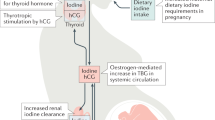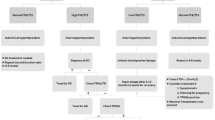Abstract
Although thyroid medications are frequently prescribed during pregnancy, paediatricians treating the respective neonates often have no information about the underlying maternal thyroid disease, and inconsistencies in postnatal diagnostics may result. We analysed a cohort of 1819 mothers admitted for delivery in 1 year to one hospital. We analysed the pre- and postpartum diagnostics in the mothers, the postnatal diagnostics in the neonates and their postnatal auxological development. Two hundred thirteen mothers (11.7%) had “thyroid disease”; 37 (2.0%) had Hashimoto thyroiditis, seven (0.4%) Graves’ disease and 169 (9.3%) “thyroid disease of other origins”. One hundred eighty-eight out of 213 (88%, 10.3% of the entire cohort) took levothyroxine. Pre- and postpartum diagnostics of the mothers and postnatal diagnostics of the neonates revealed striking inconsistencies. For example, 39 % of the gynaecologists routinely determined TSH, while only 59% carried out a dosage adjustment for known hypothyroidism. Second specialists were consulted in 86%. Unnecessary postpartum diagnostics were initiated in 19/213 neonates (9%). TRAb was analysed, however, in only one neonate born from the mothers with Graves’ disease—a condition in which further diagnostic efforts are mandatory.
Conclusion: Although many pregnant women have thyroid dysfunction, we observed a lack of uniformity in the diagnostic approach of the women and their neonates.
What is Known: • Disturbed maternal thyroid function in pregnancy often has an adverse impact on both the mother and the foetus. • Although detailed guidelines for managing impaired maternal thyroid function during pregnancy have been published, their application in clinical practice varies widely. | |
What is New: • Recommendations for managing the newborn of a mother presenting with thyroid disease of unknown entity are remarkably inconsistent. • This leads to a possible over-diagnosis in general and a potentially life-threatening failure to note neonatal hyperthyroidism requiring rapid treatment. |



Similar content being viewed by others
Abbreviations
- Ab:
-
Antibody
- ATA:
-
American Thyroid Association
- fT3:
-
Free Triiodothyronine
- fT4:
-
Free Tetraiodothyronine
- SDS:
-
Standard deviation score
- Tg:
-
Thyreoglobulin
- TPO:
-
Thyroid peroxidase
- TRAb:
-
Thyrotropin (TSH)-receptor-antibodies
- TSH:
-
Thyroid-stimulating hormone
References
Vanderpump MP, Tunbridge WM (2000) The epidemiology of thyroid diseases. In: Braverman LE, Utiger RD (eds) The thyroid: a fundamental and clinical text, 8th. Lippincott Williams and Wilkins, Philadelphia
Canaris GJ, Manowitz NR, Mayor G, Ridgeway EC (2000) The Colorado thyroid disease prevalence study. Arch Intern Med 160:526–534
Aoki Y, Belin RM, Clickner R, Jeffries R, Phillips L, Mahaffey KR (2007) Serum TSH and total T4 in the United States population and their association with participant characteristics: National Health and Nutrition Examination Survey (NHANES 1999-2002). Thyroid 17(12):1211–1223
Moreno-Reyes R, Glinoer D, Van Oyen H, Vandevijvere S (2013) High prevalence of thyroid disorders in pregnant women in a mildly iodine-deficient country: a population-based study. J Clin Endocrinol Metab 98(9):3694–3701
Klein RZ, Haddow JE, Faix JD, Brown RS, Hermos RJ, Pulkkinen A, Mitchell ML (1991) Prevalence of thyroid deficiency in pregnant women. Clin Endocrinol 35:41–46
Hollowell JG, Staehling NW, Flanders WD, Hannon WH, Gunter EW, Spencer CA, Braverman LE (2002) Serum TSH, T(4), and thyroid antibodies in the United States population (1988 to 1994): National Health and Nutrition Examination Survey (NHANES III). J Clin Endocrinol Metab 87(2):489–499
van den Boogaard E, Vissenberg R, Land JA, van Wely M, van der Post JA, Goddijn M, Bisschop PH (2011) Significance of (sub)clinical thyroid dysfunction and thyroid autoimmunity before conception and in early pregnancy: a systematic review. Hum Reprod Update 17(5):605–619
Abalovich M, Gutierrez S, Alcaraz G, Maccallini G, Garcia A, Levalle O (2002) Overt and subclinical hypothyroidism complicating pregnancy. Thyroid 12:63–68
Benhadi N, Wiersinga WM, Reitsma JB, Vrijkotte TG, Bonsel GJ (2009) Higher maternal TSH levels in pregnancy are associated with increased risk for miscarriage, fetal or neonatal death. Eur J Endocrinol 160:985–991
Negro R, Formoso G, Mangieri T, Pezzarossa A, Dazzi D, Hassan H (2006) Levothyroxine treatment in euthyroid pregnant women with autoimmune thyroid disease: effects on obstetrical complications. J Clin Endocrinol Metab 91:2587–2591
Haddow JE, Palomaki GE, Allan WC, Williams JR, Knight GJ, Gagnon J, O’Heir CE, Mitchell ML, Hermos RJ, Waisbren SE, Faix JD, Klein RZ (1999) Maternal thyroid deficiency during pregnancy and subsequent neuropsychological development of the child. N Engl J Med 341:549–555
Lazarus JH, Bestwick JP, Channon S, Paradice R, Maina A, Rees R, Chiusano E, John R, Guaraldo V, George LM, Perona M, Dall'Amico D, Parkes AB, Joomun M, Wald NJ (2012) Antenatal thyroid screening and childhood cognitive function. N Engl J Med 366:493–501
Modesto T, Tiemeier H, Peeters RP, Jaddoe VW, Hofman A, Verhulst FC, Ghassabian A (2015) Maternal mild thyroid hormone insufficiency in early pregnancy and attention-deficit/hyperactivity disorder symptoms in children. JAMA Pediatr 169:838–845
Ghassabian AE, Marroun H, Peeters RP, Jaddoe VW, Hofman A, Verhulst FC, Tiemeier H, White T (2014) Downstream effects of maternal hypothyroxinemia in early pregnancy: nonverbal IQ and brain morphology in school-age children. J Clin Endocrinol Metab 99:2383–2390
Li Y, Shan Z, Teng W, Yu X, Li Y, Fan C, Teng X, Guo R, Wang H, Li J, Chen Y, Wang W, Chawinga M, Zhang L, Yang L, Zhao Y, Hua T (2010) Abnormalities of maternal thyroid function during pregnancy affect neuropsychological development of their children at 25-30 months. Clin Endocrinol 72:825–829
Wasserman EE, Pillion JP, Duggan A, Nelson K, Rohde C, Seaberg EC, Talor MV, Yolken RH, Rose NR (2012) Childhood IQ, hearing loss, and maternal thyroid autoimmunity in the Baltimore Collaborative Perinatal Project. Pediatr Res 72:525–530
Pop VJ, deVries E, vanBaar AL, Waelkens JJ, de Rooy HA, Horsten M, Donkers MM, Komproe IH, vanSon MM, Vader HL (1995) Maternal thyroid peroxidase antibodies during pregnancy: a marker of impaired child development? J Clin Endocrinol Metab 80:3561–3566
Burman KD (2009) Controversies surrounding pregnancy, maternal thyroid status, and fetal outcome. Thyroid 19(4):323–326
Korevaar T, Muetzel R, Medici M, Chaker L, Jaddoe VWV, de Rijke YB, Steegers EAP, Visser TJ, White T, Tiemeier H, Peeters RP (2016) Association of maternal thyroid function during early pregnancy with offspring IQ and brain morphology in childhood: a population-based prospective cohort study. Lancet Diabetes Endocrinol 4:35–43
Casey BM, Thom EA, Peaceman AM, Varner MW, Sorokin Y, Hirtz DG, Reddy UM, Wapner RJ, Thorp JM Jr, Saade G (2017) Treatment of subclinical hypothyroidism or hypothyroxinemia in pregnancy. N Engl J Med 376:815–825
Hales C, Taylor PN, Channon S, Paradice R, McEwan K, Zhang L, Bakhsh A, Okosieme O, Muller I, Draman MS, Gregory JW, Dayan C, Lazarus JH, Rees DA, Ludgate M (2018) Controlled antenatal thyroid screening II: effect of treating maternal suboptimal thyroid function on child cognition. J Clin Endocrinol Metab 103(4):1583–1591
Alexander EK, Pearce EN, Brent GA, Brown RS, Chen H, Dosiou C, Grobman WA, Laurberg P, Lazarus JH, Mandel SJ, Peeters RP, Sullivan S (2017) Guidelines of the American Thyroid Association for the diagnosis and management of thyroid disease during pregnancy and the postpartum. Thyroid 27:315–389
De Groot L, Abalovich M, Alexander EK, Amino N, Barbour L, Cobin RH, Eastman CJ, Lazarus JH, Luton D, Mandel SJ, Mestman J, Rovet J, Sullivan S (2012) Management of thyroid dysfunction during pregnancy and postpartum: an Endocrine Society clinical practice guideline. J Clin Endocrinol Metab 97(8):2543–2565
Lazarus J, Brown RS, Daumerie C, Hubalewska-Dydejczyk A, Negro R, Vaidya B (2014) European thyroid association guidelines for the management of subclinical hypothyroidism in pregnancy and in children. Eur Thyroid J 3(2):76–94
Laurberg P, Nygaard B, Glinoer D, Grussendorf M, Orgiazza J (1998) Guidelines for TSH-receptor antibody measurements in pregnancy: results of an evidence-based symposium organized by the European Thyroid Association. Eur J Endocrinol 139(6):584–586
Wang W, Teng W, Shan Z, Wang S, Li J, Zhu L, Zhou J, Mao J, Yu X, Li J, Chen Y, Xue H, Fan C, Wang H, Zhang H, Li C, Zhou W, Gao B, Shang T, Zhou J, Ding B, Ma Y, Wu Y, Xu H, Liu W (2011) The prevalence of thyroid disorders during early pregnancy in China: the benefits of universal screening in the first trimester of pregnancy. Eur J Endocrinol 164(2):263–268
Ogilvy-Stuart AL (2002) Neonatal thyroid disorders. Arch Dis Child Fetal Neonatal Ed 87(3):F165–F171
Zuppa A, Perrone S, Sindico P, Alighieri G, Antichi E, Carducci C, Romagnoli C (2009) Fetal and neonatal outcomes in infants of mothers with TSH receptor antibody positivity in pregnancy. Pediatr Med Chir 31:72–77
van der Kaay DC, Wasserman JD, Palmert MR (2016) Management of neonates born to mothers with Graves’ disease. Pediatrics 137(4):1–11
Besancon A, Beltrand J, Le Gac I, Luton D, Polak M (2014) Management of neonates born to women with Graves' disease: a cohort study. Eur J Endocrinol 170(6):855–862
Smith C, Thomsett M, Choong C, Rodda C, McIntyre HD, Cotterill AM (2001) Congenital thyrotoxicosis in premature infants. Clin Endocrinol 54:371–376
Vila L, Velasco I, González S, Morales F, Sánchez E, Torrejón S, Soldevila B, Stagnaro-Green A, Puig-Domingo M (2014) Controversies in endocrinology: on the need for universal thyroid screening in pregnant women. Eur J Endocrinol 170:17–30
Thompson W, Russell G, Baragwanath G, Matthews J, Vaidya B, Thompson-Coon J (2018) Maternal thyroid hormone insufficiency during pregnancy and risk of neurodevelopmental disorders in offspring: a systematic review and meta-analysis. Clin Endocrinol 88(4):575–584
Burch HB, Burman KD, Cooper DS, Hennessey JV (2014) A 2013 survey of clinical practice patterns in the management of primary hypothyroidism. J Clin Endocrinol Metab 99:2077–2085
Luewan S, Chakkabut P, Tongsong T (2011) Outcomes of pregnancy complicated with hyperthyroidism: a cohort study. Arch Gynecol Obstet 283(2):243–247
Author information
Authors and Affiliations
Contributions
Patricia C. Weissenfels conducted the data collection, was involved in data analysis and wrote the initial manuscript.
Prof Joachim Woelfle was involved in data analysis and interpretation and carried out a critical revision of the article.
Dr. Eckhard Korsch was involved in extensive literature research data analysis and interpretation and carried out a critical revision of the article.
Dr. Mathias Joergens was involved in data collection and analysis and interpretation and carried out a critical revision of the article.
Prof Bettina Gohlke developed the study concept and design, wrote the final version of the manuscript and carried out data analysis and interpretation.
All authors approved the final manuscript as submitted and agree to be accountable for all aspects of the work.
Corresponding author
Ethics declarations
Conflict of interest
The authors declare that they have no conflicts of interest.
Informed consent
Informed consent was obtained from all individual participants in the study.
Additional information
Communicated by Peter de Winter
Electronic supplementary material
ESM 1
(DOCX 17 kb)
Rights and permissions
About this article
Cite this article
Weissenfels, P.C., Woelfle, J., Korsch, E. et al. Inconsistencies in the management of neonates born to mothers with “thyroid diseases”. Eur J Pediatr 177, 1711–1718 (2018). https://doi.org/10.1007/s00431-018-3232-9
Received:
Revised:
Accepted:
Published:
Issue Date:
DOI: https://doi.org/10.1007/s00431-018-3232-9




